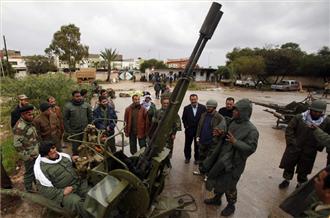Libyan pro-democracy protesters are closing to Gaddafi’s stronghold in the capital as the humanitarian crisis was mounting
Libyan pro-democracy protesters are closing to the long-time ruler Muammar Gaddafi’s stronghold in the capital as the revolution is spreading deeper from the eastern half of the country to the west, and humanitarian crisis was mounting.
In the key western city of Zawiya, less than an hour by car from Tripoli, protesters on Sunday had taken complete control of the town.
However, tanks were surrounding Zawiyah and locals feared an imminent raid by pro-Gaddafi forces.
An AFP reporter arriving in Nalut, 24km west of Tripoli, found that Gaddafi's security forces had entirely disappeared from the streets.
Firmly in the hands of the opposition, eastern Libya is moving to form its own interim government centered in the country's second city, Benghazi, where the uprising started 10 days ago, and vowing to send a force against Gaddafi in Tripoli.
Opposition figures said they had formed a national council to act as the political face of the anti-Gaddafi movement.
However, pro-Gaddafi forces, still maintained control of the western border with Tunisia, and had set up about 20 checkpoints on the road to Tripoli, with western towns taken over by the opposition in recent days in danger of being cut off from food, medical supplies and fuel, according to Tunisian officials and migrant workers escaping the violence there.
HUMANITARIAN CRISIS?
Local observers described the situation on Libya’s Tunisian border as "a humanitarian crisis", with UN officials said that tens of thousands of migrants - many from Egypt - were stranded near Libya's Tunisian border in need of food and shelter.
The exodus of Egyptian workers from western Libya began on Wednesday, but has since been intensifying, BBC's Jim Muir at the Ras Jdir border crossing with Tunisia saod.
Although more aircraft and ships were due in Tunisia to accelerate the evacuation of migrant workers, the country's authorities were no longer able to cope with the influx, Liz Eyster of the UN refugee agency (UNHCR) told the BBC.
"They've been accommodating people in shelters, schools and places of their own," she said. "But we're now aware of the fact that they're very much stretched and they need the support of the international community."
The local representative of the Red Crescent said the position was a humanitarian crisis.
"The entire world should mobilise to help Egypt repatriate its nationals," Monji Slim told AFP news agency.
"WILL TO NEGOTIATE"
On the other hand, in interviews with news agencies, Gaddafi's son, Saif al-Islam Gaddafi, suggested the government was willing to negotiate with protesters while warning, in interviews with news agencies, that the nation was falling into civil war.
"The unrest will break up the country just as in Afghanistan," he told broadcaster al-Arabiya.
In an interview with ABC News, his brother, Saadi, called the revolts sweeping the Middle East "an earthquake."
"It's a fever," he said. "It's going to spread everywhere. No one can - will stop it."
GENEVA TALKS
Foreign ministers from around the world are gathering in Geneva to discuss their response to the mounting crisis in Libya.
US Secretary of State Hillary Clinton was flying to Geneva last night for talks with European foreign ministers and diplomats from the Middle East and Africa in an attempt to further co-ordinate the international response to the crisis in Libya.
Late on Saturday, the UN Security Council unanimously backed an arms embargo and asset freeze on senior Libyan government officials.
It also voted to refer Gaddafi to the International Criminal Court for alleged crimes against humanity.
In a telephone interview with a Serbian TV, Gaddafi said the sanctions were null and void.
"The people of Libya support me, small groups of rebels are surrounded and will be dealt with," he added.
